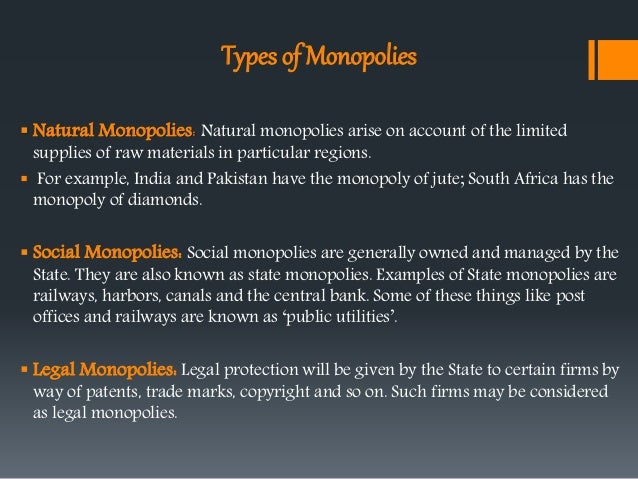

This includes preventing the entry of competition entering the market, preventing competitive conduct and the demise of competition within the market or any other market related to the corporation with power. Section 46, misuse of market power, states that corporations with significant power in a market are prohibited to use their power in that market or any other market to reduce competition in that market. In Australia, monopolization is illegal in accordance with the section 46 of the CCA. Therefore monopolization sometimes lead to debate and disputes. Its market power comes from historic accidence, business acumen and superior product. Its monopolist success is sourced from the maintenance and willful acquisition of its power. For example, business can defense that its business conducts bring merits for consumers. Business can also justify if it is judged to be monopolized by the court. The typical predatory and exclusionary acts include things such as excessive purchase and supply, pricing, refusal to deal. If a company acquires its monopoly by using business acumen, innovation and superior products, it is regarded to be legal if a firm achieves monopoly through predatory or exclusionary acts, then it leads to anti-trust concern. In-depth analysis of the market and industry is needed for a court to judge whether the market is monopolized. Some state courts have higher market share requirements for this definition. Usually, a monopolized firm has more than 50% market share in a certain geographic area. For the court, it will evaluate the firm’s market share. Monopolization is defined as the situation when a firm with durable and significant market power. For instance, non-standard contracts that exclude rivals are now lawful if supported by a "valid business reason", unless the plaintiff can establish that the defendant could achieve the same benefits by means of a less restrictive alternative. At the same time, they have relaxed the standards governing other conduct by monopolists. Moreover, the Supreme Court has clarified the standards governing claims of predatory pricing.

More recently, courts have retained the safe harbor for "competition on the merits". This distinction reflected the economic theory of the time, which saw no beneficial purposes for what Professor Oliver Williamson has called non-standard contracts. At the same time, courts condemned as "unlawful exclusion" tying contracts, exclusive dealing, and other agreements that disadvantaged rivals.
ILLEGAL MONOPOLY EXAMPLES FREE
Such conduct was lawful per se, since it constituted the normal operation of economic forces that a free economy should encourage. Courts equated such competition on the merits with unilateral conduct such as product improvement, the realization of economies of scale, innovation, and the like. Instead, such conduct must exclude rivals on some basis other than efficiency.įor several decades courts drew the line between efficient and inefficient exclusion by asking whether the conduct under scrutiny was "competition on the merits". The mere fact that conduct disadvantages rivals does not, without more, constitute the sort of exclusionary conduct that satisfies this second element. First, that the defendant possesses monopoly power in a properly defined market and second that the defendant obtained or maintained that power through conduct deemed unlawfully exclusionary. Under long-established precedent, the offense of monopolization under Section 2 of the Sherman Antitrust Act has two elements. Generally this means that corporations may not act in ways that have been identified as contrary to precedent cases. any part of the trade or commerce among the several states, or with foreign nations shall be deemed guilty of a felony." Section 2 also forbids "attempts to monopolize" and "conspiracies to monopolize". Section 2 of the Sherman Act states that any person "who shall monopolize. It is also illegal in Australia under the Competition and Consumer Act 2010 (CCA). It has a specific legal meaning, which is parallel to the "abuse" of a dominant position in EU competition law, under TFEU article 102. Monopolization is a federal crime under Section 2 of the Sherman Antitrust Act of 1890.

The main categories of prohibited behavior include exclusive dealing, price discrimination, refusing to supply an essential facility, product tying and predatory pricing. In United States antitrust law, monopolization is illegal monopoly behavior.


 0 kommentar(er)
0 kommentar(er)
